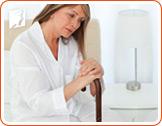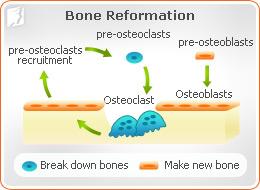Osteoporosis is a degenerative bone disease that often affects menopausal women. Research has shown that most women will have a certain level of natural and unavoidable bone loss during their lifetime. Often, the disease can go undiagnosed for years because there are no immediate signs and symptoms. Those with severe bone thinning may require medical attention because they are at an increased risk for fractures and breaks.
Osteoporosis is a debilitating disease that can significantly impair a woman's quality of life. It's important for women to learn about the effects of osteoporosis during menopause and how to prevent and treat osteoporosis. Keep reading to discover more about osteoporosis and menopause.
How Are Osteoporosis And Menopause Linked?

Osteoporosis is a degenerative bone disorder in which the bones become thinner and more fragile, resulting in fractures or breaking. It is natural for bones to weaken over time. In fact, when women reach their early to mid-30s, their bodies are less capable of rebuilding bones, and greater bone loss occurs. When a woman reaches her mid-40s and goes through menopause, she becomes even more susceptible to bone decay.
Bones are composed of two major elements: minerals and bone cells, both of which are needed to maintain bone health. Minerals include calcium and phosphorus and the bone cells are comprised of osteoclasts and osteoblasts. The former breaks down bones while the latter rebuilds them.
Osteoporosis makes bones more susceptible to breaks and fractures. The most common areas affected include the wrist, spine, and hip. Fractures and breaks can often result from a simple fall or bump. These injuries can greatly reduce quality of life and, in some cases, shorten your lifespan.
Causes of Osteoporosis

The leading cause of osteoporosis is a hormonal imbalance that occurs during menopause. Decreased levels of estrogen hinder the body's ability to regenerate bones and consequently, more bone matter is broken down and lost. Although your lifestyle can influence bone health, most cases of osteoporosis are caused or exacerbated by menopause. Some other causes for this bone disease include calcium or vitamin D deficiencies, insufficient muscle training, and the use of certain medications.
What to Do About Osteoporosis and Menopause
Osteoporosis is a treatable disease. Many women should start early on to maintain bone healthy by leading a healthy lifestyle. This means eating a balanced diet that is rich in calcium, vitamin D, and other essential nutrients and incorporating strength training exercises into daily workout routines. During menopause, women should continue these habits and consult a doctor to evaluate their current bone health and assess their risk for developing osteoporosis.
Balancing estrogen levels is often the most important factor and the best way to lower risks and do this effectively is by combining a healthy diet and exercise program with proper osteoporosis treatments.
Sources
- New York State Department of Health.(n.d)."Calcium and Healthy Bones." Retrieved from www.health.state.ny.us.
- Cleveland Clinic.(n.d)."Menopause and Osteoporposis." Retrieved from http://my.clevelandclinic.org.
- National Osteoporosis Foundation.(n.d)."Prevention: Who's at Risk." Retrieved from www.not.org.
- "What You Need to Know about Osteoporosis." American Physical Therapy Association



